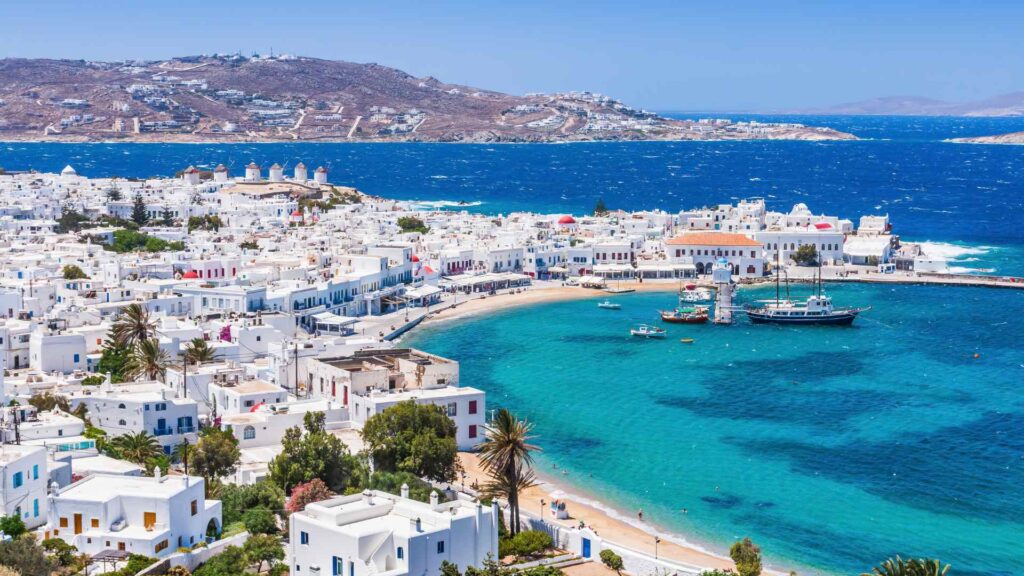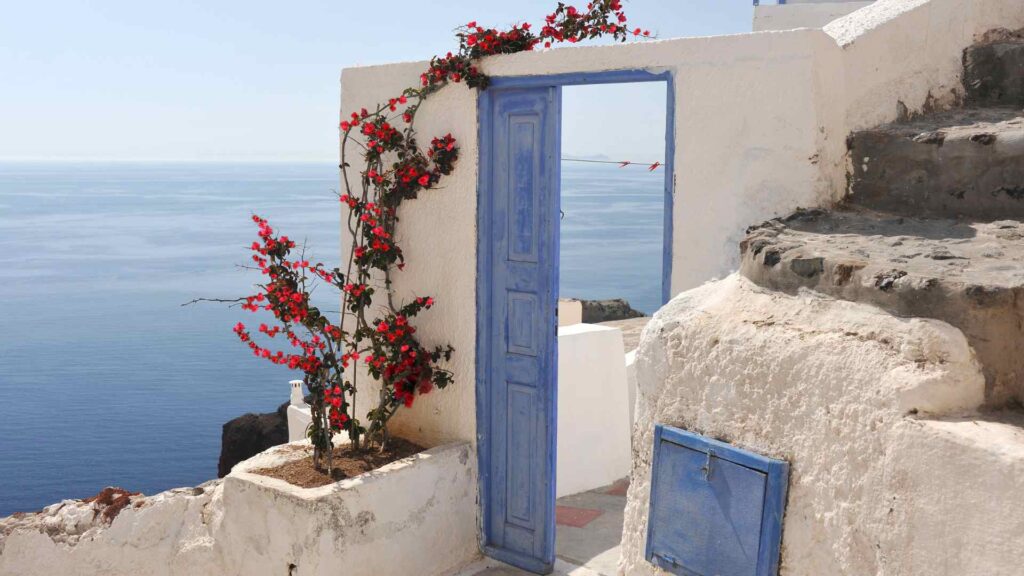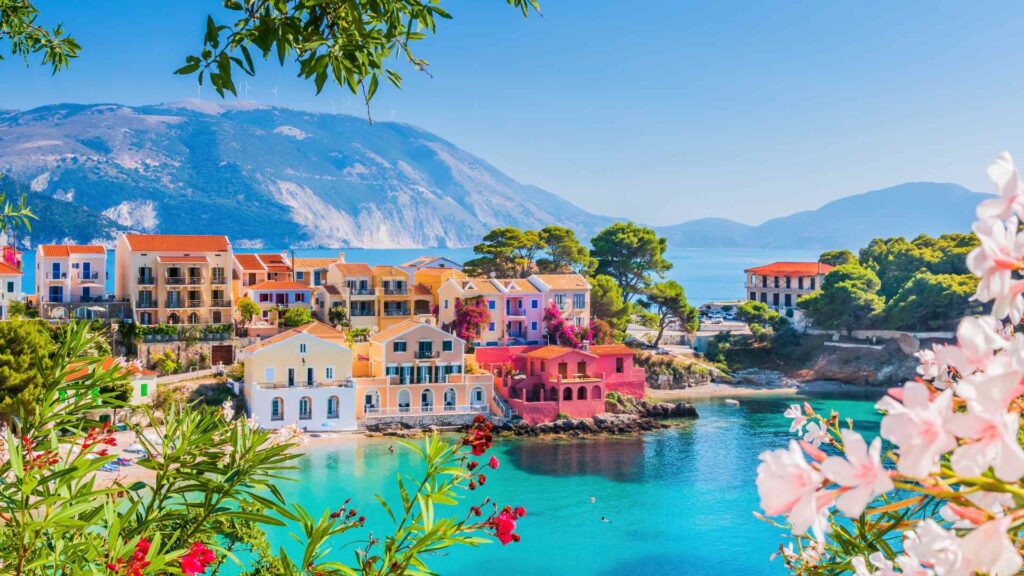Greece, the cradle of Western civilization, enchants visitors with its rich history, stunning landscapes, and vibrant culture.
From ancient myths to modern customs, this guide uncovers 145 captivating fun facts about Greece, grouped into fascinating categories.
Dive in to learn more about this beautiful Mediterranean gem!
The Land of Greece
- Greece has over 6,000 islands, but only 227 are inhabited.
- Mount Olympus is Greece’s highest peak and was considered the home of the gods in ancient mythology.
- Greece boasts an impressive coastline of 13,676 kilometers, making it one of the longest in the world.
- The country is known for its 300 sunny days per year, making it a top travel destination.
- Santorini’s iconic white-and-blue architecture was inspired by traditional Cycladic designs.
- The Corinth Canal, built in the 19th century, connects the Aegean and Ionian Seas.
- Greece is situated at the crossroads of Europe, Asia, and Africa.
- Crete, Greece’s largest island, is the birthplace of the Minoan civilization, Europe’s first advanced society.
- Meteora features monasteries perched atop towering rock formations, creating a breathtaking landscape.
- Lake Plastira is a man-made marvel and a haven for nature lovers.
- Greece is one of the world’s most seismically active countries due to its location near tectonic plate boundaries.
- The Gulf of Corinth is one of the world’s deepest gulfs.
- The island of Ikaria is a “Blue Zone,” where people live significantly longer than average.
- Navagio Beach on Zakynthos is famed for its picturesque shipwreck and turquoise waters.
- Athens is one of the world’s oldest cities, with recorded history spanning over 3,400 years.

Greek History and Mythology
- Ancient Greece is credited with laying the foundations of Western philosophy, democracy, and art.
- The Parthenon, dedicated to Athena, is one of the most iconic landmarks in Greece.
- The first Olympic Games were held in Olympia in 776 BC.
- The ancient Greeks were the first to suggest the Earth was round.
- The myth of Atlantis was first mentioned by the Greek philosopher Plato.
- Greek mythology features powerful gods like Zeus, Poseidon, and Hades.
- The Oracle of Delphi was considered a direct link to Apollo, the god of prophecy.
- The Trojan War, famously recounted in Homer’s “Iliad,” is steeped in Greek mythology.
- Spartan warriors were known for their discipline and combat prowess.
- Ancient Greeks believed in a concept called “xenia,” or hospitality, which was sacred.
- Greece was part of Alexander the Great’s empire, which stretched to India.
- The theater originated in Greece, with Athens hosting the first known plays.
- Socrates, Plato, and Aristotle, legendary philosophers, hailed from Greece.
- The Marathon race originates from the legend of a Greek soldier running from Marathon to Athens.
- The word “museum” comes from the Greek “Mouseion,” meaning a place dedicated to the Muses.
Greek Food and Drinks
- Olive oil is a staple of Greek cuisine and a symbol of its rich agricultural heritage.
- Feta cheese, a key ingredient in many Greek dishes, is protected by EU regulations.
- Souvlaki, grilled meat on skewers, is a beloved Greek street food.
- Moussaka, a layered eggplant and meat dish, is a traditional favorite.
- Greece is one of the world’s largest producers of saffron.
- Retsina is a unique wine flavored with pine resin, a tradition dating back to ancient Greece.
- Baklava, a sweet pastry, is a popular dessert with Ottoman influences.
- Ouzo, an anise-flavored spirit, is considered Greece’s national drink.
- Dolmades, grape leaves stuffed with rice or meat, are a Greek classic.
- The Mediterranean diet, inspired by Greek cuisine, is renowned for its health benefits.
- Kalamata olives are named after the city of Kalamata in southern Greece.
- Greek coffee is boiled, not brewed, and served with grounds at the bottom.
- Easter is the most important holiday in Greece, celebrated with lamb on a spit.
- Loukoumades, honey-soaked doughnuts, were first served to ancient Olympians.
- Greece is home to over 120 indigenous grape varieties.

Greek Culture and Traditions
- The Greek language has been spoken for over 3,000 years, making it one of the oldest in the world.
- Name days are more important than birthdays in Greek culture.
- The evil eye, or “mati,” is a common superstition in Greece.
- Traditional Greek dance includes the Syrtaki, made famous by the movie “Zorba the Greek.”
- Blue and white symbolize the Greek flag and the nation’s connection to the sea.
- Many Greeks celebrate Christmas by decorating boats instead of trees.
- Weddings in Greece often feature the tradition of smashing plates for good luck.
- Independence Day in Greece is celebrated on March 25th with parades and festivities.
- Greek Orthodox Easter is celebrated with a midnight candle-lit procession.
- The bouzouki is a traditional Greek stringed instrument.
- Many Greeks observe a “siesta” during the afternoon hours.
- Saints and icons play a vital role in Greek Orthodox spirituality.
- The phrase “it’s all Greek to me” stems from the language’s perceived complexity.
- Greece is a leading producer of marble, used in statues and buildings.
- Greeks are known for their strong sense of community and family values.
Greek Natural Wonders
- The Vikos Gorge in Greece is one of the deepest canyons in the world.
- Samaria Gorge in Crete is a UNESCO Biosphere Reserve.
- Greece is home to more than 7,500 caves, including many underwater ones.
- The pink sand beaches of Elafonissi in Crete are a natural wonder.
- Meteora’s rock formations date back millions of years.
- The Aegean Sea is known for its crystal-clear waters and biodiversity.
- Mount Athos is a sacred monastic community and UNESCO World Heritage Site.
- Greece has over 2,000 species of plants that don’t grow anywhere else in the world.
- The olive tree, sacred in Greek mythology, is abundant throughout the country.
- Greece’s seas are home to the endangered Mediterranean monk seal.
- Volcanic soil on Santorini produces unique wines and produce.
- The island of Kefalonia features the stunning Melissani Cave Lake.
- Greece’s national tree is the olive tree, a symbol of peace and prosperity.
- The Arched Bridge of Plaka is the longest single-arch stone bridge in the Balkans.
- Greece has more archaeological museums than any other country in the world.

Bonus Facts About Greece
- The capital of Greece, Athens, gets its name from the goddess Athena.
- Greek yogurt, known for its thick texture, is a global favorite.
- Ancient Greeks believed in democracy, coining the term from “demos” (people) and “kratos” (power).
- Greece is home to more archaeological sites than any other nation.
- The Mykonos windmills are iconic landmarks of the island.
- Greece was the first civilization to use coins as currency.
- The Pythagorean theorem originated in ancient Greece.
- Greek weddings often feature “crowns” or “stefana” in the ceremony.
- Greece has more theatrical stages than any other country.
- Homer’s epics, the “Iliad” and the “Odyssey,” remain literary masterpieces.
- Thessaloniki, Greece’s second-largest city, is known for its vibrant nightlife.
- Greece is one of the world’s top producers of sea sponges.
- The Temple of Apollo at Delphi was considered the center of the world.
- The flag of Greece has nine stripes representing the syllables of “Freedom or Death.”
- Greek shepherds often use koumparas, or handmade crooks.
- Ancient Greeks believed in a concept called “arete,” striving for excellence in all things.
- Athens is one of the few European capitals without a significant river.
- Greece’s postal service is known as Hellenic Post or “ELTA.”
- The Rio-Antirrio Bridge is the world’s longest multi-span cable-stayed bridge.
- The Thessalian plains are known as Greece’s “breadbasket.”
- Mycenae was a major center of Greek civilization during the second millennium BC.
- The Olympic flame is always lit in Olympia before traveling to its host city.
- Ancient Greeks are credited with the invention of the watermill.
- Greece has won two Nobel Prizes in Literature.
- The Temple of Hephaestus in Athens is one of the best-preserved ancient temples.
- Crete’s Palace of Knossos is associated with the legend of the Minotaur.
- The Greek alphabet is the basis for many modern alphabets, including Latin.
- Greece’s national anthem has 158 verses, making it one of the longest in the world.
- Thessaloniki is home to a 15th-century tower called the “White Tower,” a famous landmark.
- Greece has one of the highest numbers of archaeological museums globally.
- The Cyclades islands got their name because they form a circle (“kyklos” in Greek) around Delos.
- The first known historian, Herodotus, hailed from ancient Greece.
- The traditional Greek coffee cup designs often include symbols of good luck and protection.
- The Battle of Marathon inspired not only a race but also a modern expression of endurance.
- Greece has no deserts, but its rocky terrain is often described as “lunar-like.”
- The olive tree planted by Athena still stands in Athens near the Parthenon, symbolizing wisdom.
- Rhodes’ medieval city is one of the best-preserved in Europe.
- Greece is the only country allowed to carry the flame of the Olympic torch.
- Ancient Greeks invented the yo-yo, making it one of the world’s oldest toys.
- Greek honey, particularly thyme honey, is world-renowned for its quality and flavor.
- The Corinthian column design originated in Greece and is a hallmark of classical architecture.
- Skiing in Greece is a popular winter activity, especially in the Parnassos area.
- Greece has its own version of “Bigfoot,” known as the Vrykolakas, a mythical creature.
- Delphi was considered the “navel of the Earth” in ancient Greek religion.
- The Greek Navy is one of the oldest naval forces in the world, tracing its roots to ancient times.
- Alexander the Great is one of the most celebrated figures in Greek history and global conquest.
- Greece’s historical sites are among the most visited UNESCO World Heritage Sites worldwide.
- Syntagma Square in Athens is home to the Greek Parliament and the ceremonial guards known as Evzones.
- The Erectheion on the Acropolis features Caryatids, statues of women, instead of traditional columns.
- The island of Delos was considered sacred and is an archaeological treasure trove.
- Traditional Greek shadow theater, “Karagiozis,” continues to entertain audiences with humorous plays.
- Greece’s blue domed churches, especially in Santorini, are iconic and highly photographed.
- The Palace of the Grand Master in Rhodes is a stunning example of medieval architecture.
- Greek monks developed an alcoholic drink, Metaxa, which is still popular today.
- The town of Kalambaka is the gateway to the Meteora monasteries.
- Greece has a large expatriate community, with many Greeks living in Australia and the United States.
- Hippocrates, the “father of medicine,” was born on the Greek island of Kos.
- Greek ships carry around 20% of the world’s total merchant shipping fleet.
- The concept of “hubris,” or excessive pride, comes from ancient Greece.
- The word “gymnasium” is derived from the Greek word “gymnos,” meaning naked.
- Greece has one of the lowest divorce rates in Europe, showcasing its strong family values.
- Marathon is still a real town in Greece, near the site of the famous ancient battle.
- Greece is one of the world’s biggest exporters of marble.
- The traditional Greek tsarouchi shoe worn by Evzones features a pom-pom on the tip.
- The National Garden of Athens was originally the royal garden of Queen Amalia.
- Parga is a coastal town famed for its Venetian-style architecture.
- Naxos is the largest island in the Cyclades and was once a powerful ancient city-state.
- The Temple of Poseidon at Cape Sounion is a favorite spot for sunsets.
- The Greek word for theater, “theatron,” means “a place to behold.”
- Greece is home to several endemic bird species, including the Eleonora’s falcon.
- The Battle of Thermopylae, featuring the 300 Spartans, is one of Greece’s most legendary stories.
- Ancient Greek ships often had eyes painted on their prows for protection.
- Greece’s port of Piraeus has been a hub of maritime trade since ancient times.
- The island of Hydra prohibits cars and relies on donkeys for transportation.
- The National Archaeological Museum in Athens houses over 11,000 exhibits from all over Greece.
Conclusion:
Greece’s rich tapestry of history, culture, and natural beauty makes it a truly unique destination.
Whether exploring ancient ruins or savoring delicious cuisine, there’s always something new to learn about this captivating country.
